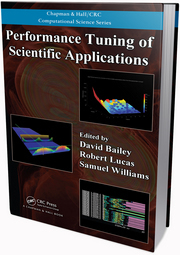Performance Tuning of Scientific Applications
March 11, 2011

David Bailey and Samuel Williams of the Lawrence Berkeley National Laboratory’s Computational Research Division (CRD) recently published a book called, Performance Tuning of Scientific Applications, which presents current research in performance analysis from some of the most notable experts in the field.
In addition to Bailey and Williams, Robert Lucas, Director of Computational Sciences at the Information Sciences Institute was also an editor for the book, which is the ninth in the Computational Science Series from CRC Press. Berkeley Lab Deputy Director and renowned computer scientist Horst Simon edits the series.
According to Bailey, it was Simon who suggested that a book on performance science be added to the CRC computational science series since performance encompasses system architecture, system software, computer science and algorithms, all of which are essential components of the field. “I am very pleased with how the book turned out, the coverage of topics is truly excellent and it is hard to think of any aspect of present-day performance science that is not covered,” says Bailey.
- Performance monitoring: Describes the state of the art in hardware and software tools that are commonly used for monitoring and measuring performance and managing large quantities of data.
- Performance analysis: Discusses modern approaches to computer performance benchmarking and presents results that offer valuable insight into these studies.
- Performance modeling: Explains how researchers deduce accurate performance models from raw performance data or from other high-level characteristics of a scientific computation.
- Automatic performance tuning: Explores ongoing research into automatic and semi-automatic techniques for optimizing computer programs to achieve superior performance on any computer platform.
- Application tuning: Provides examples that show how the appropriate analysis of performance and some deft changes have resulted in extremely high performance.
Performance analysis has grown into a full-fledged, sophisticated field of empirical science. Describing useful research in modern performance science and engineering, this book helps real-world users of parallel computer systems to better understand both the performance vagaries arising in scientific applications and the practical means for improving performance.
In addition to Bailey and Williams, other Berkeley Lab contributors to the book include Associated Lab Director for Computing Science, Kathy Yelick, as well as Mark Adams, John Bell, Vincent Beckner, Jonathan Carter, Khaled Ibrahim, Juan Meza, John Shalf, Hongzhang Shang, Erich Strohmaier, Lenoid Oliker, Lin-Wang Wang, Harvey Wasserman and Zhengji Zhao.
“We really got a ‘dream team’ of contributors,” says Bailey who is a chief technologist in the Berkeley Lab’s High Performance Computational Research Department. “When we originally sketched out the chapters, we sought the very most knowledgeable people in the field, many of which came from the Department of Energy’s Performance Engineering Research Institute, the Berkeley Lab and one author is from the University of Barcelona, Spain, so this was truly an international collaboration.”
Bailey has published several books and numerous research studies on computational and experimental mathematics. He has been a recipient of the ACM Gordon Bell Prize, IEEE Sidney Fermbach Award, as well as the MAA Chauvenet Prize and the Mertern Hasse Prize.
Sam Williams is a researcher in the Berkeley Lab’s Future Technologies Group in CRD. A rising star in the arena of high-performance computing, auto-tuning, computer architecture, performance modeling and very-large-scale integration technology, Williams has authored or co-authored thirty technical papers, including several award-winning papers.
The Performance Engineering Research Institute was created by DOE’s Scientific Discovery Through Advanced Computing (SciDAC) program. In 2009, Arie Shoshani and Doron Rotem of Berkeley Lab’s Scientific Data Management Research Group in CRD also edited book for the CR computational science series called, Scientific Data Management: Challenges, Technology, and Deployment.
About Berkeley Lab
Founded in 1931 on the belief that the biggest scientific challenges are best addressed by teams, Lawrence Berkeley National Laboratory and its scientists have been recognized with 16 Nobel Prizes. Today, Berkeley Lab researchers develop sustainable energy and environmental solutions, create useful new materials, advance the frontiers of computing, and probe the mysteries of life, matter, and the universe. Scientists from around the world rely on the Lab’s facilities for their own discovery science. Berkeley Lab is a multiprogram national laboratory, managed by the University of California for the U.S. Department of Energy’s Office of Science.
DOE’s Office of Science is the single largest supporter of basic research in the physical sciences in the United States, and is working to address some of the most pressing challenges of our time. For more information, please visit energy.gov/science.









